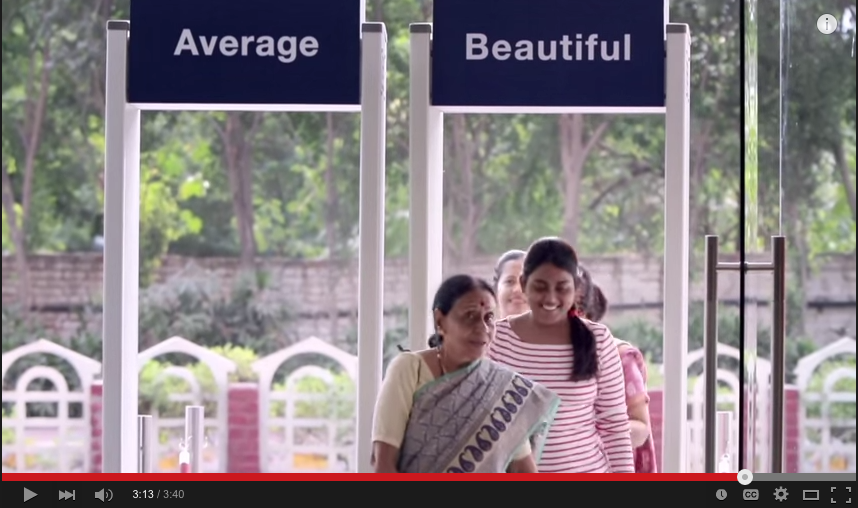Last Tuesday, Dove–a brand that sells soap, body wash, deodorant and other personal care products–launched the latest video in its long-standing "Real Beauty" series. The video is part of a offshoot campaign called "Choose Beautiful," and in just a week, more than five million people have watched it on YouTube.
The premise of the video is a guerrilla social experiment: Label two side-by-side doorways, one with the word "average" and the other with the word "beautiful" and film women walking through them, focusing on which doorway they chose. These scenes, which according to the YouTube caption, took place in San Francisco, Shanghai, Delhi, London and Sao Paulo, are interspersed with women talking about the experience.
The women shown in the three-minute video are a panoply of races, colors, hair styles and textures. They vary in age, and in one of the last scenes there’s an Indian woman in a wheelchair.
I won’t mince words here: I have a lot of problems with this concept. First, the idea that it is in women’s hands to decide whether or not they are beautiful is an absurd and overly individualistic notion that ignores the fact that beauty standards are socially constructed. Women don’t decide what beauty is; society does. The media does. The entertainment and fashion industries do. The diet industry does. And, of course, the beauty industry does.
Presenting beauty as a choice conveniently puts women in the position of being responsible for their own self-denigration, as if none of the institutions mentioned above– all of which are heavily influenced by racism, sexism, fat shaming, ableism and much more–have any role in why many women have a negative self-image.
If I decide I’m not beautiful, it’s because of my own personal failing, my own decision to not "choose beautiful"–not the 30 years of messages I’ve received about how I only need to be thinner, less hairy, less dry-skinned, more white, taller and bigger chested.
Many of these messages, of course, come from the companies who are trying to convince me to buy their products, including Dove and their parent company Unilever. But even if a non-profit women’s organization did this campaign, my critique of its framing would stand. Still, the fact that a beauty company–an entity that, by definition, profits from the sale of products we’re convinced we need to look good–is behind this campaign begs additional commentary.
Highlighting the hypocrisy of a beauty company running such a campaign is the fact that another Unilever brand is the controversial Fair & Lovely skin lightening cream sold in the Middle East and India. If the name of the product isn’t enough, the description of the product on the Unilever website drives the point home: "All active ingredients in the Fair & Lovely formulation function synergistically to lighten skin color through a process that is natural, reversible and completely safe." So these women can choose beautiful by choosing to look more white through the use of their products?
And then there’s the sexism of the "Choose Beautiful" campaign. If you’re not convinced, imagine, as one critic asks, a similar campaign aimed at men, asking them to "choose handsome." Unlikely. The idea of beauty as an arbiter of self-empowerment is inherently flawed. If we’re looking to boost women’s self-esteem, how about "choose strength"? "Choose confidence"? "Choose contentment?" One artist/activist duo asks instead for you to #ChooseDignity.
"Choose Beautiful" doesn’t stop with the video though. Another element involves the Dove Twitter account essentially trolling women who post negative things about their bodies.
 Screenshot of tweets from Tech Times article
Screenshot of tweets from Tech Times article
The tweets are borderline creepy and patronizing attempts at telling women on Twitter how they should feel about themselves.
I’m all for corporations, particularly those that market products to women, making an effort to conscientiously market their products in a way that does not reinforce harmful ideas about beauty. Lane Bryant recently launched an ad campaign in direct response to Victoria Secret’s "Perfect Body" campaign that sparked backlash for picturing uniformly thin, toned, tall women with long hair. (The backlash was so intense the company changed the slogan to "A Body for Every Body.")
Lane Bryant’s campaign shows images of plus-size models in poses similar to the Victoria’s Secret ad, accompanied with the #ImNoAngel hashtag. I think that’s a step in the right direction. Lane Bryant isn’t pretending to do anything other than advertise its products with a clever and somewhat counter-cultural message.
Still, there is a world of difference between responsible marketing and companies that use bogus self-empowerment campaigns to sell more products built on the idea that we are not OK as we are. If Dove actually wanted to improve women’s self-esteem, they should give away the money they are spending on this pretend culture-change campaign to an independent organization that could use those ample resources to actually help shift the cultural forces that tell women they aren’t beautiful unless they are thin, white, tall, large-breasted and hairless.
But it’s highly unlikely that a beauty company would do such a thing since the success of that kind of campaign might subtract from the projected $265 billion dollar global beauty industry.
I’m not saying that positive affirmations are useless. As a masculine-presenting, queer, fat and Latina person, coming up with my own definitions of self-worth and attractiveness has been important to me. But I can’t ignore the systems that create the ideals many of us are struggling against. When a beauty company whose profit model relies on selling us these ideals tries to make us believe that change can come solely from how individual women define themselves, I call bullshit.
